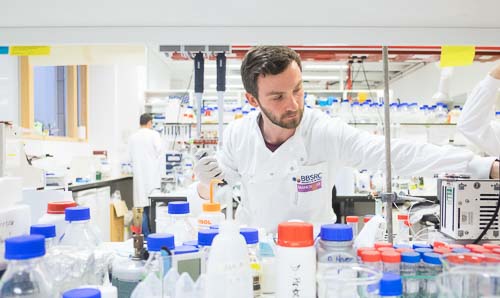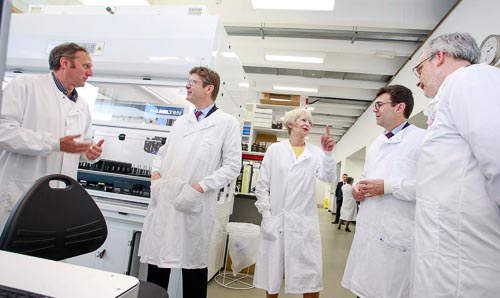
Research impact
Our research is designed to have impact. From fundamental knowledge right through to the food on your plate, biotechnology contributes to many of today’s advancements in health, nutrition, energy, and transport.
Queens Anniversary Prize
The MIB was recognised by the Queens Anniversary Prize for Higher and Further Education in 2019 that celebrates its pioneering expertise in industrial biotechnology and in developing disruptive bio-based technologies.
We consider the impact that our work will have right from inception to fruition. By making this a core strand of our work, we ensure that our research contributes back to the society that made it possible for us to be here.
Our research impacts on various themes within society, most notably the economy, policy, health, and the environment. We also work hard to engage with local communities and make our work accessible to as many people as possible. Below are just some instances of where our work has had impact.
Environment
Advances in industrial biotechnology have the potential to transform the industrial landscape, realise sustainable production and address many global challenges including resource efficiency, climate change and energy shortages reducing our reliance on petrochemicals. Our work in biocatalysis and synthetic biology has made positive steps is this area:
Environmental sustainability – sustainable bio-propane production
Much of our research focuses on creating sustainable and green chemicals, materials, and energy. We harness biocatalysis and synthetic biology by using newly-discovered and engineered enzymes as well as bespoke cascades, and designed pathways to create valuable products in an efficient and renewable manner.
Many fuels currently used to power industry are sourced from finite, non-renewable petrochemicals. Even where cleaner, plant-derived alternative are available, they often require land and agricultural chemicals in their production, contributing to environmental damage and reducing the areas available for food production. Professor Nigel Scrutton, in collaboration with colleagues at the University of Turku, have created modified microbes that can produce propane using waste products from other industries. This breakthrough means that a greener process now exists to produce a direct alternative to liquid petroleum fuels.
Spinout – C3 Biotechnologies
C3 Biotechnologies Ltd (C3 BIOTECH) is using emergent technologies such as synthetic biology to design new biofuels. The company works across biomanufacturing and distribution supply chains to deliver next-generation fuels that are sustainable, renewable, and cost effective.
C3 BIOTECH has developed proprietary technologies for the producing bio-ethanol (from carbon dioxide), liquefied petroleum gas (from waste materials) and precursors of aviation fuel components. C3 BIOTECH is working with the Future BRH to develop economic scaled production platforms for these products.
Future BRH is supporting C3 BIOTECH to commercialise its fuels portfolio by offering guidance in techno-economics analysis and assessments of environmental impacts. These analyses are then feed into industry sponsored programmes to scale up laboratory processes into pilot and demonstrator programmes.
Health and quality of life
Fundamental MIB research is helping us to understand disease processes, provide new diagnostic methods and providing novel routes to pharmaceuticals:
Better Health – the early detection of Parkinson’s disease
As well as our green production strategies for pharmaceutical compounds and biotherapeutics, we also contribute to many other areas of biomedical innovation. Our work in this area ranges from fundamental studies of biomolecules and biological process implicated in ill health to novel diagnostics and interventions for various diseases.
Parkinson’s Disease is a neurodegenerative condition that affects many people (mainly the elderly) across the UK and worldwide. Utilising the MIB’s state-of-the-art mass spectroscopy facilities, Professor Perdita Barran and Dr Drupad Trivedi have identified compounds which Parkinson’s patients secrete through their skin. This new analytic technique affords us the opportunity to detect and diagnose the disease earlier, as well as providing enhanced testing for at-risk groups. The project was inspired by some people’s ability to detect a distinctive smell around people with Parkinson’s.
Spinout – Manchester BIOGEL
Manchester BIOGEL (formerly PeptiGelDesign) was founded in 2013 by Drs Aline Miller and Alberto Saiani. Manchester BIOGEL provides performance hydrogels that have applications in the pharmaceutical, biotechnology, and cosmetic industries as well as in academia.
The product, PeptiGel, is a synthetic biocompatible and biodegradable hydrogel with tailored mechanical properties and functionality for a range of biotechnological applications. These hydrogels are composed of an entangled network of elongated fibres that mimic the structure of extra cellular matrices.
Manufactured in a dedicated facility with rigorous quality controls, PeptiGel is consistent across batches, is supplied ready-to-use, and is available in a range of mechanical strengths and viscosities to suit the needs and environments of cell cultures.
PeptiGel allows for 3-D cell culture and has applications as a drug delivery vehicle, scaffolds for cell-based therapies and assays as well as tissue engineering, which enables the next generation of therapeutic treatments.
Spinout – C4X Discovery
C4X Discovery, founded by Dr Andrew Almond, uses the latest biotechnology research to develop drugs for the areas of immunology and inflammation, neurology and neurodegeneration, and cancer (including immuno-oncology).
One of their key offerings is the Nuclear Magnetic Resonance (NMR) based technology platform, Conformetrix. This platform, which is used in a proprietary partnership with AstraZeneca, allows chemists to easily measure the dynamic 3-D shapes of free drug molecules. This gives new and helpful insights into the behaviour and physical properties of drug molecules and permits faster and cheaper drug development.
Policy and economy
We actively engage with a broad audience to ensure that our science is relevant to national and international grand challenges, and to ensure maximum benefit:
Development of a sustainable future
Industrial biotechnology research in the MIB aims to transition chemicals manufacture from petrochemicals to sustainable biomanufacturing by connecting national strengths in IB discovery science with industry, stimulating innovation and positioning the UK at the vanguard of clean economic growth.
Our leading academics have contributed to national and international working groups and policy / position papers including synthetic biology biosecurity, ethics and horizon scans.
Policy engagement
Manchester’s unique capabilities and vision for industrial biotechnology and chemicals manufacture is precisely aligned with major government themes, including the ‘eight great technologies’ that will propel the UK to future growth in an area where the UK can globally lead.
Over the last few years the MIB has welcomed UK and international government officials to the MIB. Examples include the launch of the UK Northern Industrial Strategy with members of Parliament in attendance and the Chinese Minister of Science.
Through membership of scientific boards (e.g. Synthetic Biology Leadership Council) and contribution to several roadmaps the MIB has strived to ensure a cohesive national science strategy. Examples include roadmaps for synthetic biology (UK Strategic Plan for Synthetic Biology 2016 – Bio‐design for the bio‐economy), the engineering of biology towards sustainable production process, and delivery of a bio-based economy for clean growth.
Society and culture
We work hard to engage locally and nationally to make our research accessible to as many people as possible and to inspire the next generation of research leaders:
Cultural engagement – music and mutation
We might be a powerhouse for scientific research and innovation, but we also work to promote science as culture alongside more the more usual constituents of art, music, literature, history, and language. We partner with national and local festivals, as well as events at cultural institutions such as museums, libraries, and concert venues to deliver science through art.
Traditional outreach practices often rely on visual, spoken, or written information to convey complex scientific principles and research methodologies. So instead, Dr Michelle Philips at the Royal Northern College of Music and MIB lecturer Dr Nick Weise took real DNA sequences used in biocatalytic research and composed three movements for a string trio. The pieces have been performed live to concertgoers, and recordings were made so that people could listen as they pleased. The work makes a traditionally difficult-to-access topic more accessible, and also challenges the perceptions of science and scientists through a playful, creative, and emotive medium.
Social inclusion – inspiring language communities
It is important when engaging with the public to ensure activities are designed to be as inclusive as possible. One of our core aims is to reach non-traditional outreach audiences by using spaces and places not traditionally linked with science and employing novel or creative methods for engagement. We have organised many activities and events to help people understand and interact with our work, especially audiences whose native languages are not English.
Greater Manchester is one of the most linguistically diverse cities in Western Europe and the MIB houses researchers from across the world with a myriad of language skills. The Inspiring Language Communities project-matches bilingual scientists with local communities who share that language. This initiative empowers local groups to engage with science in their own language and talk about it in a way that is more personal and relevant to them. This is particularly important for young people when discussing subject and career choices with their parents and teachers. The project also provides more inclusive outreach opportunities for the many researchers in the Institute who have English as a second or third language.
Training
The MIB aims to train and inspire the next generation of research leaders, work with industry for continued development and engage with wider publics. See our study and training opportunities.



